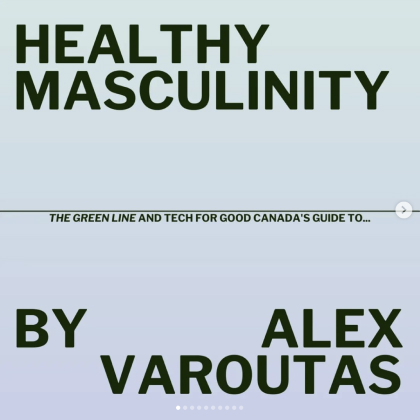THE GREEN LINE AND
TECH FOR GOOD CANADA’S GUIDE TO...
HEALTHY MASCULINITY

WITH JONATHON REED

Alex Varoutas
Scarborough mans and former chef. Big advocate of pantry diversification. Using wasabi-flavoured peanuts to heal the world.
November 10, 2021
Defining
the problem
Navigating boyhood and figuring out what it means to be a man can be challenging, especially today. According to Statistics Canada, a woman was killed every six days in Canada by an intimate partner in 2018.
But even when male aggression isn’t directed outwards, it’s often directed inwards. On average, boys are three times more likely to commit suicide than girls in Canada, Statcan reports. Statistics like these put into perspective the danger of raising boys in a society that expects them to be aggressive and dominant in every aspect of their life.
That’s why, in partnership with Tech for Good Canada, The Green Line interviewed Next Gen Men program manager Jonathon Reed about how he became a healthy masculinity advocate and why Torontonians should do the same.
Meet
Jonathon
Jonathon Reed is a program manager at Next Gen Men, an organization dedicated to helping boys grow up with a healthy sense of masculinity that doesn’t require them to deny their thoughts and feelings.

📸: Provided by Jonathon Reed.
How it
starts
From a young age, boys are taught to bottle up their emotions in the name of manliness. They convince themselves that their feelings are invalid and that they should never ask for help. When explaining this, Reed refers to a bell hooks quote that he feels captures the essence of the problem. “The first act of violence that patriarchy demands of males is not violence toward women. Instead, patriarchy demands of all males that they engage in acts of psychic self-mutilation — that they kill off the emotional parts of themselves,” he says.
Reed takes a nuanced approach when discussing the issue, avoiding terms such as “toxic masculinity,” which he says can be too polarizing. Reed adds that it can be difficult to distinguish between toxicity and masculinity, especially if you haven’t thought carefully about how gender is constructed. “The phrase that I use most often is actually ‘precarious masculinity.’ And the idea with precarious masculinity is that, as boys and men, we are in a unique position where our identity as men can constantly be called into question, and that means that we constantly have to prove ourselves as boys and men,” he says.
“I kind of go out of my way to avoid the term ‘toxic masculinity’ because it’s so polarizing.”
JONATHON REED
27, RIVERDALE
“If you take out sexual violence, men are...the primary perpetrators, but also the primary victims of all forms of violence."
JONATHON REED
27, RIVERDALE
Why it
matters
It’s no secret that the subject of “toxic masculinity” is often met with resistance, particularly from men who are new to the idea and can feel as if they’re being vilified for something that may have never crossed their minds before. Reed says the best way to approach these kinds of conversations is with the perspective that toxic masculinity affects both women and men. Just as patriarchal concepts and frameworks confine women to gender-based roles and norms, men are also confined to restrictive definitions of masculinity, he adds. In addition, men who feel the need to assert their dominance through violence often direct that aggression towards men and women.

📸: Provided by Jonathon Reed.
Talking
about it
Encouraging the next generation of boys to embrace healthy masculinity involves more than just having conversations about consent and gender-based violence. It involves creating a space where boys feel safe expressing themselves and can navigate challenges together. The ability to maintain this kind of environment is what Reed says is the “distinction between being a teacher, and being a facilitator and a mentor.”
And in
Conclusion
As Reed says, it’s easy to underestimate the power of conversation, and to believe that there must be a more substantive action to take. But the easiest way to make a difference is to create relationships where transformation can happen. Talk to boys in your life about what’s happening in the news or at school, and find out how they’re really feeling about it all. The insights gained from these conversations will help guide future discussions about issues they might face down the road.
Next Steps and
Resources
Actions
Next steps for people who want to take action,
but don’t know where to start.
Rethink
Your Language
Terms like “toxic masculinity” can often come with a negative connotation that can make it hard to begin a conversation about the subject. Reed, for example, prefers the term “precarious masculinity” as it leaves more room for discussion without vilifying anyone or making assumptions.
Build Strong
Relationships
Conversations are important, but in order to be productive, the people involved need a safe space. By reconsidering the role you play in the lives of the young boys in your circle of influence, you may find opportunities to provide an environment where they can feel comfortable expressing themselves without the fear of judgment.
Get
Informed
This subject can seem daunting, especially if you’re new to the subject, but that’s okay! There are plenty of resources that can help increase your understanding of the issue. This will better prepare you to have meaningful discussions without feeling frustrated or misunderstood.
Join Our
Community
Gather with other like-minded Green Line community members to take action on healthy masculinity.
Resources
Community-curated resources
to help you take action.




